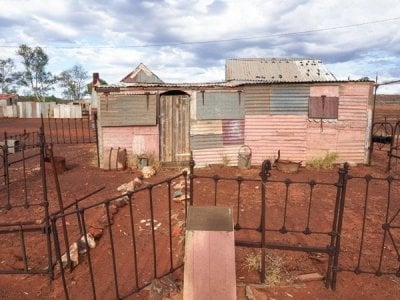Grieving Daughter's Home Invasion Nightmare - Squatters Take Over & Ruin Her Father's Legacy!
By
Gian T
- Replies 34
In a tale that reads like a script from a dramatic thriller, a grieving daughter in Victoria, Australia, was left reeling from a shocking discovery that would add to her sorrow. Carol, a resident of Westmeadows in Melbourne's northwest, found herself at the centre of a home ownership debate that has since sparked a national conversation, including commentary from the outspoken writer Clementine Ford.
Carol's ordeal began when she approached her late father's home, which had been mostly vacant for the last 12 to 15 years due to her caring responsibilities for her mother and prior renovations. To her astonishment, her key no longer worked. Upon further investigation, she realised that squatters had broken in, changed all the locks, and cleared out the house of all its contents – from furniture and clothing to personal and sentimental items that held memories of her late father.
The emotional toll of such a violation is hard to quantify. For Carol, it wasn't just about the loss of physical items but the erasure of her family's presence from a place that once held so much history and love. The police were called, and with the help of neighbours who confirmed Carol's ownership, they gained entry to the property. The squatters were not present, but evidence of their stay was clear – they had moved in their own furniture, including a fridge and a washing machine.
Legal advice given to Carol suggested hiring a security guard to ward off the squatters and arranging for them to collect their belongings under supervision before changing the locks. However, the situation is not as straightforward as it seems. The incident has highlighted the complexities surrounding property rights, homelessness, and the rental market in Australia.
Clementine Ford, known for her left-wing commentary, weighed in on the debate, sympathising with Carol's loss but also pointing out the failures of the rental market in Australia. Ford defended the squatters' actions, arguing that the dire situation of the rental market and the lack of renters' rights justify the occupation of a house that has been mostly empty for years. She criticised the concept of property as an investment and called for a reevaluation of property ownership as a basic right to help reduce or eliminate homelessness, particularly among older women.
The government's Specialist Homelessness Services Annual Report 2022–23 supports Ford's concerns, revealing a 40% increase in older women seeking help for homelessness in the last decade. The report attributes this rise to a shortage of affordable housing, lower lifetime earnings, and savings for women, and the aging population.
Ford's personal reflections on her own housing insecurity and the broader implications for Australia's property market add depth to the discussion. She calls for stricter regulations on property investors to ensure homes are not left vacant while many struggle to find stable housing.
This incident has opened up a Pandora's box of issues related to property ownership, homelessness, and social justice. It raises questions about the balance between the rights of property owners and the needs of the community, especially in a country where the gap between the haves and have-nots seems to be widening.
As members of the Seniors Discount Club, many of you may have experienced or know someone who has faced similar challenges with property and housing. We invite you to share your thoughts and experiences in the comments below. How do you think Australia should address the issue of vacant properties and homelessness? What rights should homeowners have when their properties are invaded, and what support should be available to those in need of housing?
 This story is not just about a house; it's about the fabric of our society and how we care for the most vulnerable among us. It's a conversation that needs to be had, and we're here to facilitate that discussion.
This story is not just about a house; it's about the fabric of our society and how we care for the most vulnerable among us. It's a conversation that needs to be had, and we're here to facilitate that discussion.
Carol's ordeal began when she approached her late father's home, which had been mostly vacant for the last 12 to 15 years due to her caring responsibilities for her mother and prior renovations. To her astonishment, her key no longer worked. Upon further investigation, she realised that squatters had broken in, changed all the locks, and cleared out the house of all its contents – from furniture and clothing to personal and sentimental items that held memories of her late father.
The emotional toll of such a violation is hard to quantify. For Carol, it wasn't just about the loss of physical items but the erasure of her family's presence from a place that once held so much history and love. The police were called, and with the help of neighbours who confirmed Carol's ownership, they gained entry to the property. The squatters were not present, but evidence of their stay was clear – they had moved in their own furniture, including a fridge and a washing machine.
Legal advice given to Carol suggested hiring a security guard to ward off the squatters and arranging for them to collect their belongings under supervision before changing the locks. However, the situation is not as straightforward as it seems. The incident has highlighted the complexities surrounding property rights, homelessness, and the rental market in Australia.
Clementine Ford, known for her left-wing commentary, weighed in on the debate, sympathising with Carol's loss but also pointing out the failures of the rental market in Australia. Ford defended the squatters' actions, arguing that the dire situation of the rental market and the lack of renters' rights justify the occupation of a house that has been mostly empty for years. She criticised the concept of property as an investment and called for a reevaluation of property ownership as a basic right to help reduce or eliminate homelessness, particularly among older women.
The government's Specialist Homelessness Services Annual Report 2022–23 supports Ford's concerns, revealing a 40% increase in older women seeking help for homelessness in the last decade. The report attributes this rise to a shortage of affordable housing, lower lifetime earnings, and savings for women, and the aging population.
Ford's personal reflections on her own housing insecurity and the broader implications for Australia's property market add depth to the discussion. She calls for stricter regulations on property investors to ensure homes are not left vacant while many struggle to find stable housing.
This incident has opened up a Pandora's box of issues related to property ownership, homelessness, and social justice. It raises questions about the balance between the rights of property owners and the needs of the community, especially in a country where the gap between the haves and have-nots seems to be widening.
As members of the Seniors Discount Club, many of you may have experienced or know someone who has faced similar challenges with property and housing. We invite you to share your thoughts and experiences in the comments below. How do you think Australia should address the issue of vacant properties and homelessness? What rights should homeowners have when their properties are invaded, and what support should be available to those in need of housing?
Key Takeaways
- A Victorian woman discovered squatters had changed the locks and cleared out her late father's home, which had been mostly vacant for the last 12 to 15 years.
- Lawyer David Whiting advised the woman to hire security and confront the squatters to reclaim her property.
- Writer Clementine Ford highlighted issues with Australia's rental market, expressing sympathy for the women's situation but also defending the squatters' rights due to housing shortages.
- Ford calls for a change in Australia's attitude towards property ownership, advocating for fixed-term and long-term rental leases to combat homelessness and make housing more accessible, especially for older women facing a crisis in homelessness.









